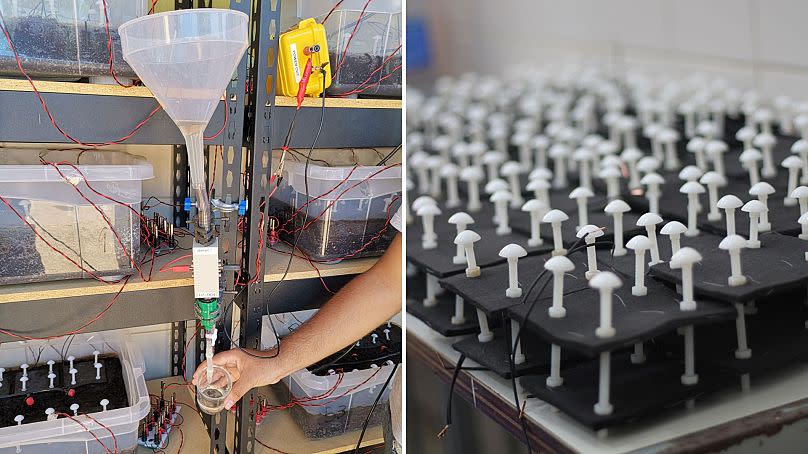‘Install and forget’ soil-powered batteries could bring cheap, clean energy to farms in Europe

Bacteria-powered batteries could soon supply farms with cheap, sustainable energy.
UK startup Bactery draws on the electrons produced by bacteria in soil to harvest clean electricity from the earth.
Its soil-rechargeable batteries have the potential to work around the clock - and around the world.
The company’s founders hope the technology will accelerate the shift towards data-driven agriculture, helping farmers to increase yields and conserve resources without having to install expensive and hard-to-maintain energy infrastructure.
How do the bacterial batteries work?
Bactery’s bacteria-powered batteries build on ‘soil microbial fuel cells’ (SMFCs), which capture energy from natural chemical reactions that occur in soil-based microorganisms.
Carbon-based electrodes are positioned in the soil and connected to an external circuit. This system transfers the electrons generated by certain microorganisms as they ‘consume’ the organic compounds present in the soil, turning them into electricity.
Stacks of these cells can be connected to a battery to store this energy.
Dr Jakub Dziegielowski was part of the research team that developed SMFCs in 2019 during his PhD in Chemical Engineering at the University of Bath in the UK. These were tested on a water filtration system in Brazil.
‘Solar Marshall Plan’: Can Ukraine become the world’s first post-war country rebuilt on renewables?
Scientists have built a ‘digital twin’ of Earth to predict the future of climate change
Now, he’s taking the concept a step further by developing ways to scale up electricity generation that are tailored to the biological processes in the soil.
Over the last four years of research and development, "we’ve learned a whole lot more about the different bioelectrochemical processes, and grasped a better understanding of the roles both bacteria and the soil play in this complex equation," Dr Dziegielowski tells Euronews Green.
"This know-how enabled us to engineer solutions that stimulate and control selective processes in the ground, allowing us to maximise energy extraction and sustain continuous electricity generation for years."
In the next 12 months, his company Bactery will continue refining its prototypes with a view to starting small scale production before launching a commercial product in 2026.

How could bacteria batteries help farmers?
Technology is rapidly developing to help farmers collect data on the state of their fields, take care of crops and reduce costs.
But sensors and internet-connected devices require power that’s not always easy to install and maintain. Cables can obstruct fields, single-use chemical batteries need to be monitored and replaced, and renewable energy sources like solar panels only work at full capacity in the right weather conditions.
“Farmers are increasingly valuing the importance of data to make informed decisions towards resource-efficient agricultural practises,” says Professor Mirella Di Lorenzo, one of Bactery’s directors and a teacher of chemical engineering at the University of Bath.
“We are removing the barrier to generating that data by creating a sustainable way to power sensors, and making them always-on, cheap, low-maintenance and low-impact.”
Bacteria’s soil-powered batteries can last for over 25 years and cost just £25 (€30) per unit with no maintenance requirements.
“Bringing our product to this stage and putting theory into practice through several years of research has been a challenging, yet incredibly rewarding experience,” says Dr Dziegielowski.
“I am excited to see the company make a positive difference in agriculture, and in other sectors.”

 Yahoo News
Yahoo News 
